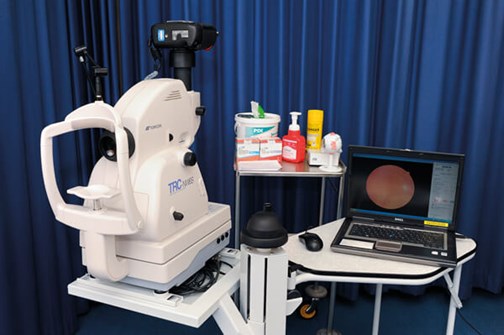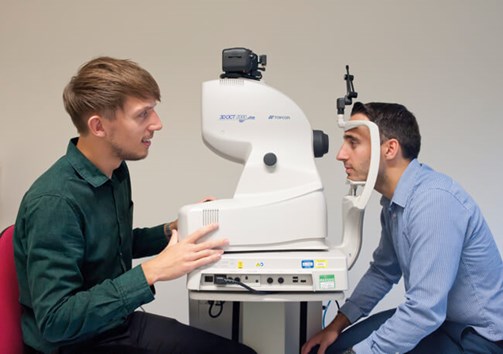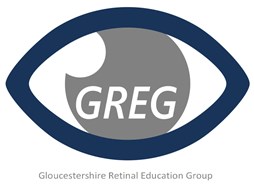To relaunch our Allied Professionals section, Paul Dimmock from Gloucestershire discusses his unique role with the Gloucestershire Retinal Education Group.
In Gloucestershire we have a collection of ophthalmic-targeted departments led by Professor Peter Scanlon, Clinical Director of the NHS Diabetic Eye Screening Programme. This includes the Diabetic Eye Screening Programme, Ophthalmic Imaging, Medical Photography, Gloucestershire Retinal Education Group and the Gloucestershire Retinal Research Group. There are many staff in split-role positions which offers something unique here in Gloucestershire and this helps to create a diverse and adaptable team of professionals.
I am the only digital learning technologist in this department and as a Masters graduate in Television Production I would never have guessed my career path would take me from working as a third assistant director in television, to capturing vessel flow in a patient’s eye! I have been working for Gloucestershire Hospitals since 2013, but for the last four of those years I have been working in the world of online learning, specifically the creation of teaching and assessments for ophthalmic-related courses on an e-learning platform.
My career

Prior to starting in the NHS, I studied a BA (Hons) in Marine and Natural History Photography in 2007, which progressed into a Master of Arts in Television Production in 2010. I went on to work in television in various roles, from camera operation to assistant director. These experiences prepared me to problem-solve effectively and think on my feet.
My first role within Gloucestershire Hospitals was as a screener in the diabetic eye team, the training was comprehensive and it was comforting to know you were entering a role where you were supported until both you and the management were happy. It seemed appropriate to throw myself into the theory, as I knew this was my weaker area. Where some staff had come from a scientific background, others, like me, were more technical. I’ll never forget being able to capture images on my first day with the support of staff, and it wasn’t long before I had mastered the non-mydriatic fundus cameras.

A screener’s responsibility is to capture annual images of diabetic patients and, in Gloucestershire, the service is provided locally at GP surgeries or in a mobile screening van. Imaging patients is certainly different to any photography I’d done previously, and over the first few months I learnt about how staff receive and grade the images we had taken. I completed the relevant diploma that coincides with the role and in 2014 I was interviewed and accepted for a position on the ophthalmic imaging team.
“I would never have guessed my career path would take me from working as a third assistant director in television, to capturing vessel flow in a patient’s eye”
This new role was a steep learning curve, within six months I was trained in the acquisition of optical coherence tomography (OCT), fundus fluorescein angiography and several other imaging techniques. In Gloucestershire Hospitals all the ophthalmic imaging staff come from within the diabetic eye team and complete diabetic retinopathy grading as part of their job role. This was no different for me and alongside imaging I was trained in retinopathy grading. The expanded role offered more opportunity to learn about other clinical pathologies beyond diabetes. Being able to assist the experts in diagnosis and management through various imaging techniques is very rewarding.
Over the last few years ophthalmic imaging in Gloucestershire has rapidly expanded, as it has across the UK, with an increased need for more diverse and regular imaging of patients. I settled into the role of ophthalmic imager and diabetic screener / grader and I was occasionally involved in the creation of video content for the Gloucestershire Retinal Education Group (GREG) who were responsible for the diploma in diabetic retinopathy qualification that I had already completed.

In 2015 the GREG team offered me an opportunity to join them, to assist with the creation of new online learning for courses in development.
As I had already been working on media content for the team, and enjoyed being able to use my video production skills, I recognised what a fantastic opportunity this was. There appeared to be a clear development plan for qualifications in OCT and I felt I could offer support to provide teaching materials that learners would find helpful.
Since 2016 I have officially been employed as a Digital Learning Technologist and Ophthalmic & Research Imager, as this is a unique role, I have a specific job description. The role has very much been developmental, but has presented many opportunities. It has been a welcome challenge to understand the online learning systems and how or what can be produced to educate students, it is an on-going process with further training always required. With exposure to the clinical environment I was able to develop new skills, while remaining informed and being exposed to current trends and technology.

GREG provides courses in partnership with the University of Gloucestershire; they offer learning support to students internationally, accessed in Europe, Asia, South America, Africa and more! When I joined there was an established Certificate of Higher Education in Diabetic Retinopathy Screening for international students and the City & Guilds in Diabetic Retinopathy Screening and Grading, which later became the Health Screeners Diploma.
My first task was to gain experience in learning management systems (LMS) to help the team build content in-house and provide the teaching online for students. We were developing a university-accredited qualification in OCT capture and this was where I started to work with the team. Before long we were creating interactive quiz content, developing the questions and configuring them for online display. To take information and reformat it to adhere to guidelines, learning outcomes and ensure it engages the learner is what it is all about. Our Certificate of Higher Education in Optical Coherence Tomography Capture qualification has been running since June 2016 and seen six cohorts of students study the course. The education group has gone on to develop a popular Foundation Degree in Optical Coherence Tomography that comprises the Capture qualification for the first year and a further year of a University Diploma in Optical Coherence Tomography Interpretation. These qualifications are developed by GREG and accredited by the University of Gloucestershire. The content of the courses has been developed and supported by subject matter experts in ophthalmology. There are opportunities to take part in discussion forums and case presentations, as well as assessment through online exams, e-portfolios and case studies. For more information on our course offerings visit www.drscreening.org

Ref: http://karolinenanfeldt.com/blogs/learning-technologist-a-dear-child-has-many-names/
Being a learning technologist
The role of a learning technologist (LT) can vary depending on where you are employed and what content you are developing. Also, some LT’s are dedicated instructional designers and others are more of a support role. I fall somewhere in between the ‘specialised’ and ‘jack of all trades’ description and try to use all my skillsets to cover different areas of the course development process to enable the progress to be as efficient as possible. At the moment we are working on upgrading our learning platform so that we can offer more interactive and engaging online learning and I am leading the team that is moving this forward.
There is no such thing as a typical day as a learning technologist, for me each day is different. My key role is course development and that involves meeting with subject matter experts (SME) regularly to ensure that they are happy with how content is being presented, helping with the creation of exams and self-tests. Occasionally, when the experts are willing, I film their presentations on specific subjects for our learners to study. I also check in with the administration team to make sure that the current systems are running and cohorts are able to access learning. I am always problem-solving as I go, every day will turn up something I wasn’t expecting, be it student queries or system glitches!
I work with the GREG qualifications manager on advertising / marketing and create video content, flyers and Linkedin promotions. We regularly meet as a team to discuss new development projects. Currently I am working on promotional material for upcoming courses with the help of previous students! I have also developed my role as an assessor on the OCT capture course, both looking at practical skills and assessing portfolio work.
GREG offers a varied number of courses and is always looking to expand. Online, distance-learning offers more and more creative opportunities and we are looking at the potential of fundus photography modules and other imaging procedures too. With the growth in both the need for ophthalmic imaging, and the online learning possibilities, we hope to continue offering cutting edge courses for our learners!
COMMENTS ARE WELCOME





